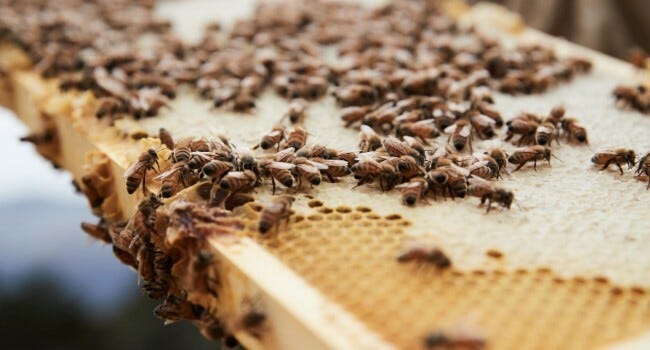
What’s so special about manuka honey, we hear you say? Well, we’re glad you asked. There’s a reason why this little golden wonder is so popular. Learn more about it here:
1. It’s produced in New Zealand by bees that pollinate the manuka tree
It’s called manuka honey because it’s made with pollen that comes from the manuka tree, which is native to New Zealand and some parts of Australia. You can recognise the manuka tree by its small white (sometimes pink) flowers and prickly leaves.
2. It has a darker colour and earthier taste than other honeys.
The colour of honey varies according to its botanical origin and the weather of the place where the plants grow. In general, dark honeys have higher mineral contents, and antioxidant levels[1]. However, as a rule, darker honeys do tend to have a stronger taste[2], which isn’t for every pallet!
3. A natural sweetener for your favourite recipes.
Given that manuka honey is rich in antioxidant compounds[3], it can be used in place of refined sugars or artificial sugars, as an alternative to satisfy your sweet tooth. It’s delicious on toast, in tea or use it in place of sugar when baking.
4. It naturally contains phenolic acids, which are antioxidants.
Manuka honey really is a little pot of gold. It’s packed full of phenolic acids[4], which are antioxidants. Antioxidants are great because they can help to protect against free radical damage.
5. It’s a key ingredient in Swisse Ultiboost Vitamin C + Manuka Honey
Given the wonderful properties of manuka honey, it’s no surprise we include it in our award-winning Swisse Ultiboost Vitamin C + Manuka Honey. Thanks to the inclusion of vitamin C to help support immune health, alongside manuka honey’s high quantity of phenolic acids, Swisse Ultiboost Vitamin C + Manuka Honey could be your new best friend during the winter months.
Always read the label. Use only as directed. Vitamin supplements should not replace a balanced diet. If symptoms persist consult your healthcare professional. Swisse Ultiboost Vitamin C + Manuka Honey contains manuka honey powder.
References:
- Ediriweera ER, Premarathna NY. Medicinal and cosmetic uses of Bee's Honey - A review. Ayu. 2012;33(2):178-182. doi:10.4103/0974-8520.105233
- Manyi-Loh CE, Ndip RN, Clarke AM. Volatile compounds in honey: a review on their involvement in aroma, botanical origin determination and potential biomedical activities. Int J Mol Sci. 2011;12(12):9514-9532. doi:10.3390/ijms12129514
- Alvarez-Suarez JM, Gasparrini M, Forbes-Hernández TY, Mazzoni L, Giampieri F. The Composition and Biological Activity of Honey: A Focus on Manuka Honey. Foods. 2014;3(3):420-432. Published 2014 Jul 21. doi:10.3390/foods3030420
- Spilioti E, Jaakkola M, Tolonen T, et al. Phenolic acid composition, antiatherogenic and anticancer potential of honeys derived from various regions in Greece. PLoS One. 2014;9(4):e94860. Published 2014 Apr 21. doi:10.1371/journal.pone.0094860
